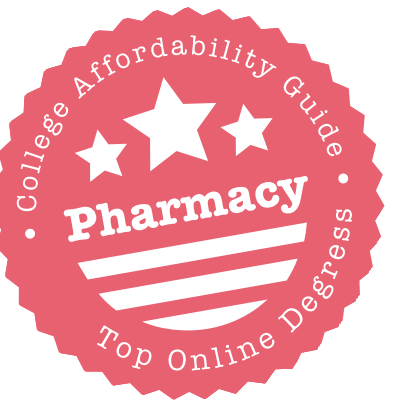2025 Top Online Pharmacy Schools
Scroll down to see the top not-for-profit colleges offering pharmacy degrees online.
 Want to see the most affordable Pharmacy degrees? View them here
Want to see the most affordable Pharmacy degrees? View them here
Tell us what you're looking for and we'll get you started!
Many schools now offer hybrid pharmacy degrees for aspiring technicians and pharmacists. In this format, traditional science courses are taught online; on-the-job training and supervised clinical rotations are arranged in the student’s local area. Some programs also require students to be present on-campus for lab work. For the PharmD, pharmacists may be able to use previous work experience to fulfill clinical requirements.
To pick the best programs, look for:
Since August of 2014, the Lake Erie College of Osteopathic Medicine School of Pharmacy has offered an online Doctor of Pharmacy (Pharm.D.) Degree. The school is fully accredited by the Accreditation Council for Pharmacy Education. While students will be required to come to campus to attend orientation and laboratory sessions, the majority of the coursework can be completed online. Students will also be required to complete experiential and clinical rotations at pharmacies, wellness centers, and hospitals, and they will be required to travel to testing sites to complete exams. The program will take four years to complete, and it is ideal for nontraditional students.
Accreditation: Accreditation Council for Pharmacy Education
Massachusetts College of Pharmacy & Health Sciences (MCPHS) offers a postbaccalaureate Doctor of Pharmacy (PharmD) pathway program for U.S-licensed pharmacists who currently have a bachelor's degree in pharmacy and want to pursue their Doctor of Pharmacy. Aside from one Saturday visit per semester and one on-campus mandatory orientation. The program can be completed within two years, and students are able to complete the experiential portion of coursework at their current place of employment. All students must complete a four-week clinical rotation at the end of the program. The pathway program will help pharmacists to further develop many skills and abilities including documenting pharmacy practices, managing professional information, and communicating effectively with patients.
Accreditation: Accreditation Council for Pharmacy Education
For nontraditional students interested in pursuing a degree with a pharmaceutical concentration, Rutgers University offers a Master of Engineering in Chemical and Biochemical Engineering with a concentration in Pharmaceutical Engineering. Students in this program should have an undergraduate degree in science, engineering, or pharmacy. Online students have access to the majority of the features available to on campus students, and in this program, students will take courses such as Pharmaceutical Process Design, Statistical Analysis and Design of Pharmaceutical Operations, Pharmaceutical Materials Engineering, as well as Pharmaceutical Development, Administration, and Absorption.
Accreditation: Accreditation Council for Pharmacy Education
49,428 Students
The Bernard J. Dunn School of Pharmacy at Shenandoah offers a Nontraditional Doctor of Pharmacy (NTDP) Pathway, which offers licensed pharmacists who already have a B.S. in Pharmacy an opportunity to further their education. The online program allows students to complete a Doctor of Pharmacy while working full-time jobs, and students are able to complete the experiential components of the program at their workplaces. The Bernard J. Dunn School of Pharmacy is accredited by the Accreditation Council for Pharmacy Education. The majority of the program is completed online. However, students must attend two executive weekends on campus during the course of the program. Students may begin in the fall, and the program takes two and a half years to complete.
Accreditation: Accreditation Council for Pharmacy Education
The James L. Winkle College of Pharmacy at the University of Cincinnati offers a Master of Science in Pharmaceutical Science with Emphasis in Cosmetic Science, a Master of Science in Pharmaceutical Sciences: Pharmacy Leadership, and a Master of Science in Drug Development Sciences entirely online. Several graduate certificates are offered online as well including a certificate in clinical trials design and research, a certificate in global regulatory affairs in drug development, and a certificate in cosmetic science. The M.S. degree may be completed in seven to eight semesters for most students, depending on how many classes each student takes per semester. Students in this program may take such courses as Pharmaceutical Science Journal Club and Statistical Principles in Clinical Research.
Accreditation: Accreditation Council for Pharmacy Education